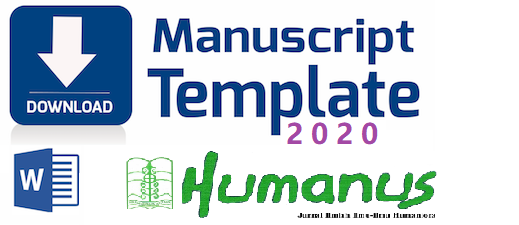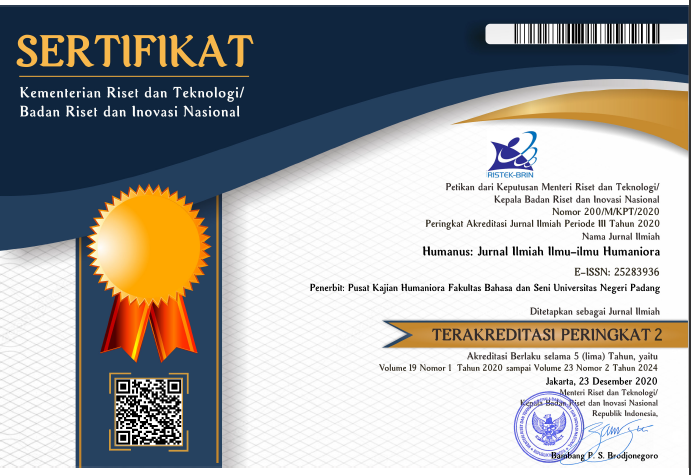Rantau and Minangkabau Women: A Global View of the Postcolonial Feminist Perspective
 ),
), (1) Universitas Negeri Padang
 Corresponding Author
Corresponding Author
Copyright (c) 2023 Humanus: Jurnal Ilmiah Ilmu-ilmu Humaniora
DOI : https://doi.org/10.24036/humanus.v22i1.119939
Full Text:
 Language : en
Language : en
Abstract
Keywords
References
Abdullah, T. (1966). Adat and Islam: An examination of conflict in Minangkabau. Indonesia(2), 1-24.
Abdullah, T. (1970). Some notes on the Kaba Tjindua Mato: An example of Minangkabau traditional literature. Indonesia(9), 1-22.
Angelia, Y. (2017). Merantau dalam menuntut ilmu (studi Living Hadis oleh masyarakat Minangkabau). Jurnal Living Hadis, 2(1), 67-82.
Aprial, D. (2020). Tradisi Merantau pada Masyarakat Minang Kabau dalam Perspektif Teori Motivasi Abraham Masslow. Jurnal Ibriez: Jurnal Kependidikan Dasar Islam Berbasis Sains, 5(2), 229-240.
Asmon, R. A., & Adri, Z. (2021). Motivasi merantau pada remaja akhir Minangkabau. NUSANTARA: Jurnal Ilmu Pengetahuan Sosial, 8(2), 77-83.
Attubani, R. (2012). Adat dan sejarah Minangkabau. Media Explorasi.
Azra, A. (2017). Surau: Pendidikan Islam Tradisi dalam Transisi dan Modernisasi. Jakarta: Kencana.
Barendregt, B. (2002). The sound of'longing for home': Redefining a sense of community through Minang popular music. Bijdragen tot de taal-, land-en volkenkunde, 158(3), 411-450.
Barthes, R. (2012). Mythologies: The complete edition. New York: Hill and Wang.
Bruhn, K. L. (2018). Community and the Rantau: West Sumatran Artists in Indonesia's Art World. Southeast of Now: Directions in Contemporary and Modern Art in Asia, 2(2), 119-142.
Dirajo, I. D. S. (1979). Mustika adat alam Minangkabau. Jakarta: Departemen Pendidikan dan Kebudayaan.
Fatimah, S. (2007). Bagindo Azizchan, 1910-1947: Pahlawan Nasional dari Kota Padang, (Padang: Yayasan Citra Budaya Indonesia bekerjasama dengan Pusat Kajian Sosial. Padang: Yayasan Citra Budaya Indonesia dan Pusat Kajian Sosial Budaya dan Ekonomi UNP.
Fatimah, S. (2012). Gender dalam komunitas masyarakat Minangkabau; Teori, praktek dan ruang lingkup kajian. Kafaah: Journal of Gender Studies, 2(1), 11-24.
Ghofur, M. I. (2017). Akulturasi Adat dan Hukum Islam Terkait Harta Warisan Suku Minangkabau. Empower: Jurnal Pengembangan Masyarakat Islam, 2(2), 53-66.
Habermas, J. (1975). Legitimation crisis (Vol. 519). Beacon Press.
Hadler, J. (2003). Rusli Amran and the rewriting of Minangkabau history. Kyoto Review of Southeast Asia.
Hadler, J. (2010). Sengketa Tiada Putus: Matriarkat, Reformisme Agama, Dan Kolonialisasi Di Minangkabau. Jakarta: Freedom Institute.
Hanani, S. (2013). Tanah ulayat dan kemiskinan perempuan. Kafaah: Journal of Gender Studies, 3(1), 27-43.
Hanani, S. (2018). Woman’s Newspapers As Minangkabau Feminist Movement Againts Marginalization In Indonesia. Jurnal GJAT, 8(2).
Herlina, N. (2020). Metode sejarah. Bandung: Satya Historika.
Ilet, A. (2022). Pola Merantau Perempuan Minangkabau Universitas Andalas].
Jendrius. (2011). Ayam Batino Lah Bakukuak: Otonomi Daerah dan Keterlibatan Perempuan dalam Pemerintahan Nagari di Sumatera Barat. Kafaah: Journal of Gender Studies, 1(2), 121-136.
Josselin de Jong, P. d. (1980). Two Essays on Minangkabau Social Organization. Leiden: Institute of Cultural and Social Studies Leiden University. 1C A Publication(8).
Kato, T. (1982). Matriliny and Migration: Evolving Minangkabau Traditions in Indonesia. Ithaca: Cornell University Press.
Lenz, B. (2005). Matrilinearity, modernity and mobility. Female migration among the Minangkabau. ZEITSCHRIFT FUR ETHNOLOGIE, 130(2), 245-271.
Lewis, R., & Mills, S. (2003). Feminist postcolonial theory: A reader. Routledge.
Moeis, I., Febriani, R., Sandra, I., & Pabbajah, M. (2022). Intercultural values in local wisdom: A global treasure of Minangkabau ethnic in Indonesia. Cogent Arts & Humanities, 9(1), 2116841.
Moore-Gilbert, B. J. (1997). Postcolonial theory: Contexts, practices, politics. Verso Books.
Mrazek, R. (1996). Sjahrir: politik dan pengasingan di Indonesia. Yayasan Obor Indonesia.
Murad, A. (1980). Merantau: Outmigration in a matrilineal society of West Sumatra (Vol. 3). Department of Demography, Australian National University.
Mutolib, A., Yonariza, Y., Mahdi, M., & Ismono, R. H. (2016). Gender inequality and the oppression of women within minangkabau matrilineal society: A Case study of the management of ulayat forest land in nagari bonjol, dharmasraya district, west sumatra province, Indonesia. Asian women, 32(3), 23-49.
Nadia, A., Chaniago, R. P., Putri, T. D., Yani, R., & Wafi, M. H. (2022). Penyebab Perempuan Minangkabau Merantau dan Pengaruh Relasi Sosial Keluarga Inti dalam Sistem Kekerabatan Matrilinieal. Psyche 165 Journal, 146-151.
Naim, M. (1984). Merantau pola migrasi suku Minangkabau.
Naim, M. (2013). Merantau Pola Migrasi Suku Minangkabau (3 ed.). Jakarta: Raja Grafindo Persada.
Narny, Y. (2016). The resilience of West Sumatran women: historical, social and cultural impacts [Thesis, Deakin University]. Melbourne.
Oktavia, S., Sumarti, T., & Pandjaitan, N. K. (2015). Proses merantau perempuan Minang di Jakarta. Sodality: Jurnal Sosiologi Pedesaan, 3(1), 63-71.
Radjab, M. (1969). Sistem kekerabatan di Minangkabau: sebuah case study dari segi tindjauan psikologi-sosial terhadap 102 buah rumah gadang di Sumpur, Padang Pandjang. Center For Minangkabau Studies Press.
Rahman, E. (2020). Antara Adat, Keluarga, dan Diri: Ekspektasi Peran Gender Perantau Perempuan Minangkabau Universitas Gadjah Mada].
Rajo Penghulu, I. H. D. (1997). Idrus Hakimi, Mustika Adat Alam Minangkabau, . Bandung: Remaja Rosdakarya.
Roesli, M. (2017). Memang Jodoh. Bandung: Qanita.
Salazar, N. B. (2016). The (im) mobility of merantau as a sociocultural practice in Indonesia. Moving places: Relations, return and belonging, 29, 21-42.
Silvey, R. M. (2000). Diasporic subjects: Gender and mobility in South Sulawesi. Women's Studies International Forum,
Siregar, E. Z., & Amran, A. (2018). Gender Dan Sistem Kekerabatan Matrilinial. Jurnal Kajian Gender dan Anak, 2(2), 133-146.
Tazid, A. (2017). Tokoh, Konsep dan Kata Kunci Teori Postmodern. Deepublish.
Thompson, P. (2002). The voice of the past: Oral history. London: Routledge.
Vansina, J. (2014). Tradisi lisan sebagai sejarah. Sleman: Penerbit Ombak.
Vickers, A. (2013). A history of modern Indonesia. Cambridge University Press.
Wahyuni, D. (2022). Menguak Budaya Matrilineal dalam Cerpen “Gadis Terindah”. Paradigma: Jurnal Kajian Budaya, 7(1), 3.
Yuli, D. (2019). Kajian Sosiologi Sastra dalam Novel Anak Rantau Karya Ahmad Fuadi. Jurnal Pembahsi (Pembelajaran Bahasa Dan Sastra Indonesia), 9(1), 13-23.
Zakia, R. (2011). Kesetaraan dan keadilan gender dalam adat Minangkabau. Kafaah: Journal of Gender Studies, 1(1), 39-52.
Zulfikarni, Z., & Liusti, S. A. (2020). Merawat ingatan: Filosofi marantau di dalam pantun Minangkabau. SASDAYA: Gadjah Mada Journal of Humanities, 4(1), 13-26.
 Article Metrics
Article Metrics
 Abstract Views : 636 times
Abstract Views : 636 times
 PDF Downloaded : 207 times
PDF Downloaded : 207 times
Refbacks
- There are currently no refbacks.
Copyright (c) 2023 Humanus: Jurnal Ilmiah Ilmu-ilmu Humaniora

This work is licensed under a Creative Commons Attribution-NonCommercial 4.0 International License.










